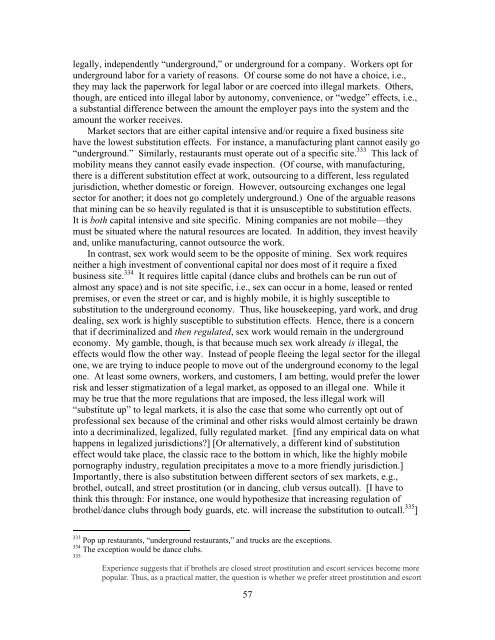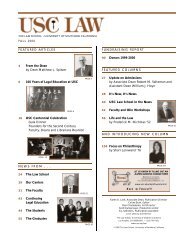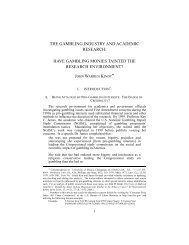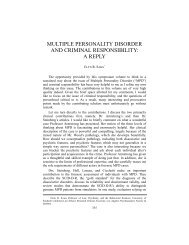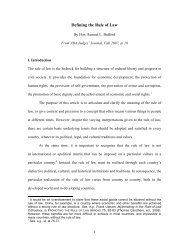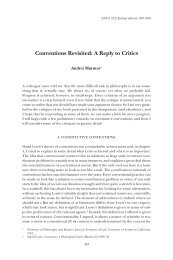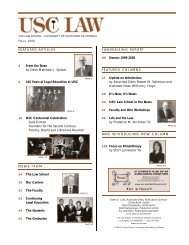1 Regulating Sex Work Adrienne D. Davis VERY ROUGH DRAFT ...
1 Regulating Sex Work Adrienne D. Davis VERY ROUGH DRAFT ...
1 Regulating Sex Work Adrienne D. Davis VERY ROUGH DRAFT ...
Create successful ePaper yourself
Turn your PDF publications into a flip-book with our unique Google optimized e-Paper software.
legally, independently “underground,” or underground for a company. <strong>Work</strong>ers opt for<br />
underground labor for a variety of reasons. Of course some do not have a choice, i.e.,<br />
they may lack the paperwork for legal labor or are coerced into illegal markets. Others,<br />
though, are enticed into illegal labor by autonomy, convenience, or “wedge” effects, i.e.,<br />
a substantial difference between the amount the employer pays into the system and the<br />
amount the worker receives.<br />
Market sectors that are either capital intensive and/or require a fixed business site<br />
have the lowest substitution effects. For instance, a manufacturing plant cannot easily go<br />
“underground.” Similarly, restaurants must operate out of a specific site. 333 This lack of<br />
mobility means they cannot easily evade inspection. (Of course, with manufacturing,<br />
there is a different substitution effect at work, outsourcing to a different, less regulated<br />
jurisdiction, whether domestic or foreign. However, outsourcing exchanges one legal<br />
sector for another; it does not go completely underground.) One of the arguable reasons<br />
that mining can be so heavily regulated is that it is unsusceptible to substitution effects.<br />
It is both capital intensive and site specific. Mining companies are not mobile—they<br />
must be situated where the natural resources are located. In addition, they invest heavily<br />
and, unlike manufacturing, cannot outsource the work.<br />
In contrast, sex work would seem to be the opposite of mining. <strong>Sex</strong> work requires<br />
neither a high investment of conventional capital nor does most of it require a fixed<br />
business site. 334 It requires little capital (dance clubs and brothels can be run out of<br />
almost any space) and is not site specific, i.e., sex can occur in a home, leased or rented<br />
premises, or even the street or car, and is highly mobile, it is highly susceptible to<br />
substitution to the underground economy. Thus, like housekeeping, yard work, and drug<br />
dealing, sex work is highly susceptible to substitution effects. Hence, there is a concern<br />
that if decriminalized and then regulated, sex work would remain in the underground<br />
economy. My gamble, though, is that because much sex work already is illegal, the<br />
effects would flow the other way. Instead of people fleeing the legal sector for the illegal<br />
one, we are trying to induce people to move out of the underground economy to the legal<br />
one. At least some owners, workers, and customers, I am betting, would prefer the lower<br />
risk and lesser stigmatization of a legal market, as opposed to an illegal one. While it<br />
may be true that the more regulations that are imposed, the less illegal work will<br />
“substitute up” to legal markets, it is also the case that some who currently opt out of<br />
professional sex because of the criminal and other risks would almost certainly be drawn<br />
into a decriminalized, legalized, fully regulated market. [find any empirical data on what<br />
happens in legalized jurisdictions?] [Or alternatively, a different kind of substitution<br />
effect would take place, the classic race to the bottom in which, like the highly mobile<br />
pornography industry, regulation precipitates a move to a more friendly jurisdiction.]<br />
Importantly, there is also substitution between different sectors of sex markets, e.g.,<br />
brothel, outcall, and street prostitution (or in dancing, club versus outcall). [I have to<br />
think this through: For instance, one would hypothesize that increasing regulation of<br />
brothel/dance clubs through body guards, etc. will increase the substitution to outcall. 335 ]<br />
333 Pop up restaurants, “underground restaurants,” and trucks are the exceptions.<br />
334 The exception would be dance clubs.<br />
335<br />
Experience suggests that if brothels are closed street prostitution and escort services become more<br />
popular. Thus, as a practical matter, the question is whether we prefer street prostitution and escort<br />
57


